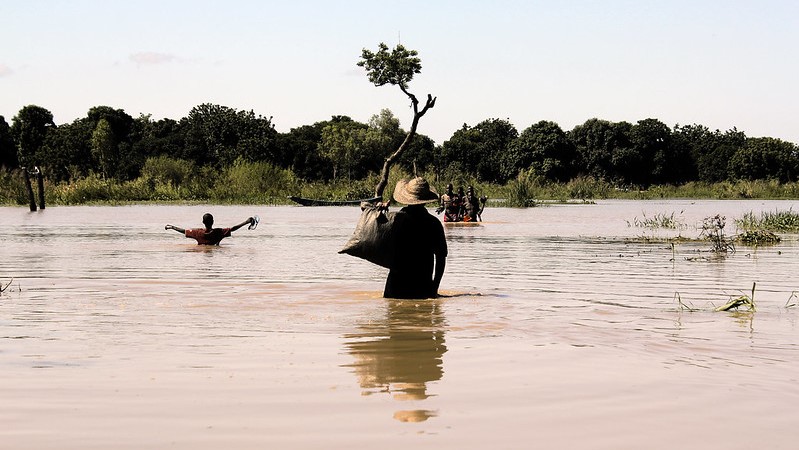Comment: Frans Timmermans and John Kerry are downplaying historic responsibility for the climate crisis. That s a red flag for Africa

Flooding in north-eastern Nigeria in 2015 (Photo: Immanuel Afolabi/Conflict & Development at Texas A&M/Flickr)
By Faten Aggad
Africa s contribution to climate change is historically negligible. Around 15% of the world’s population lives on the continent but contribute less than 3.8% of greenhouse emissions responsible for global warming.
Yet, the continent is the region that is most disproportionally affected by the impact of climate change.
The science and numbers show that Africa will feel the worst impact. The Intergovernmental Panel on Climate Change (IPCC) s latest report shows Africa has “already experienced widespread losses and damages” due to climate change.
Its modelling also confidently shows that climate change has reduced the continent’s economic growth, increasing the inequality between Africa and industrialised nations.
The African Development Bank s figures show that losses and damages in Africa are extensive. The bank gauges that the continent has been losing 5 to 15% of its GDP per capita growth because of climate change and its related impacts .
Hence recent statements, notably by the EU’s climate chief Frans Timmermans and the US special envoy John Kerry, on where responsibility for climate change lies and Africa’s place in the debate have been unsettling.
UN chief: Windfall tax on oil and gas can pay for loss and damage
Speaking to African leaders gathered for a meeting of the Global Centre for Adaptation in Rotterdam earlier this month, Timmermans argued that European citizens “will not buy the argument that “those suffering the most consequences are not responsible for creating the crisis, which puts the onus on those who were responsible”.
Echoing this sentiment, Kerry told an African ministerial conference on the environment in Dakar that: “Mother Nature does not measure where the emissions come from.”
The elephant in the room driving the remarks is clearly China. The attempts to recast the questions of historical responsibility is driven by competition, even though Timmermans and Kerry never specifically mentioned China. Yet Africa is the one being trampled. The continent has become acceptable collateral damage to score geopolitical points.
It is difficult to view this as anything other than a leadership failure. In taking these lines, Timmermans and Kerry equate African responsibility to that of Western industrialised nations, without considering consumption patterns or historical responsibilities.
More concerning is that such remarks question one of the core principles of the Paris Agreement: common but differentiated responsibilities. Under this concept, countries agreed that countries are collectively responsible for addressing climate change but some are more responsible than others.
Want climate news in your inbox? Sign up for free to get our weekly newsletter and occasional extra bulletins





